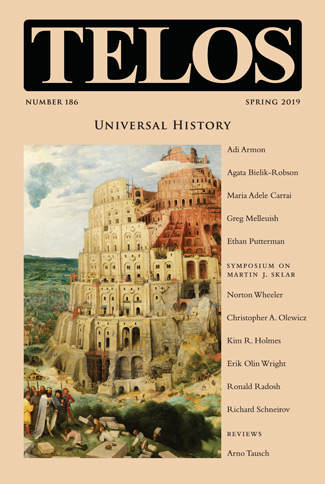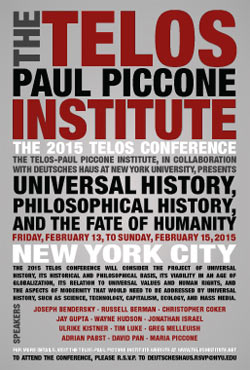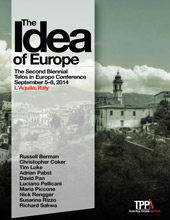By David Pan · Monday, March 18, 2019 Telos 186 (Spring 2019) is now available for purchase in our store. Individual subscriptions to Telos are also available in both print and online formats.
 This issue is devoted to the question of universal history and is based in part on a 2015 Telos-Paul Piccone Institute conference organized by Greg Melleuish. As this event suggested, universal history today imagines the convergence of humanity around a single trajectory of capitalist technological progress coupled with the defense of liberal rights. But as much as technology has increasingly linked the world into a single movement of history, we cannot say the same about liberal rights. Rather than pointing us toward the liberal light at the end of the historical tunnel, world politics seems to be casting us into the blazing arena of the “clash of civilizations” presaged by Samuel Huntington, with different regions of the world—Africa, America, Asia, Europe, the Muslim world—increasingly at odds, each region with a dominant civilization pursuing its own cultural and political hegemony. This divergence between a materialist unity of development and a cultural fragmentation frames the problem of universal history. This issue is devoted to the question of universal history and is based in part on a 2015 Telos-Paul Piccone Institute conference organized by Greg Melleuish. As this event suggested, universal history today imagines the convergence of humanity around a single trajectory of capitalist technological progress coupled with the defense of liberal rights. But as much as technology has increasingly linked the world into a single movement of history, we cannot say the same about liberal rights. Rather than pointing us toward the liberal light at the end of the historical tunnel, world politics seems to be casting us into the blazing arena of the “clash of civilizations” presaged by Samuel Huntington, with different regions of the world—Africa, America, Asia, Europe, the Muslim world—increasingly at odds, each region with a dominant civilization pursuing its own cultural and political hegemony. This divergence between a materialist unity of development and a cultural fragmentation frames the problem of universal history.
Continue reading →
By David Pan · Friday, November 10, 2017 David Pan’s “Cosmopolitanism, Tianxia, and Walter Benjamin’s ‘The Task of the Translator'” appears in Telos 180 (Fall 2017), a special issue on Cosmopolitanism and China. Read the full article at the Telos Online website, or purchase a print copy of the issue in our online store. Individual subscriptions to Telos are now available in both print and online formats.
As a term, cosmopolitanism defies simple understanding. Already in its earliest formulation, attributed to the ancient Greek Cynic Diogenes, the merging of cosmos and polite to mean “citizen of the world” had a paradoxical meaning, imagining both local belonging as a citizen and lack of a specific place in the world. If the Cynics’ notion of cosmopolitanism arises out of a rejection of conventions in general rather than the embracing of a world system, they were left in an empty space between locality and universality. This tension between belonging and universality continues into the current discussion of cosmopolitanism as a term that spans political and cultural discussions. While the modern cosmopolitan political project seeks to lay out a common institutional framework for human society, the accompanying cultural project in fact works against such unity by seeking to promote the recognition and toleration of cultural differences.
Continue reading →
By David Pan · Thursday, September 14, 2017 The following paper was presented at the conference “After the End of Revolution: Constitutional Order amid the Crisis of Democracy,” co-organized by the Telos-Paul Piccone Institute and the National Research University Higher School of Economics, September 1–2, 2017, Moscow..
The idea of liberal democracy only makes sense because of a basic contradiction between liberalism and democracy. As a description of a form of government, democracy designates a government by the people, whose decision-making power would not be restricted by any higher authority. The power of democracy derives from its ability to mobilize a majority of the members of a political order for collective goals. This rule by popular will can also entail a freedom from higher authorities, including such entities like monarchs and aristocrats, but also ecclesiastical or moral authorities that would establish basic values for guiding decision-making. Since democracy alone would lack constraints on the popular will, liberalism, as a set of principles that include protection of minorities and freedom of expression, is needed to provide the limitations on democratic decision-making that protect democracy from erratic and changes in the public mood. As such, liberalism sets a limit on democratic power, and the basic contradiction between democracy and liberalism maintains a dynamic equilibrium between popular will and liberal principles that can be stabilizing due to its flexibility.
Continue reading →
By David Pan · Sunday, June 26, 2016 Walk around Berlin these days and you will find that you will hear almost as much English being spoken on the streets as German. While some describe this situation as a sign that Berlin has now become a cosmopolitan city, this very interpretation reveals precisely the attitude that has led to the rise of English in Germany. To speak English is to be cosmopolitan, and to speak German is to be provincial, and so it becomes a mark of pride to converse in English rather than one’s native German, at least for a certain segment of the population. And therein lies the problem. For it is precisely that segment of global business people, academics, and bureaucrats against whom nationalist sentiment has been rising all over Europe amongst the monolinguals who see themselves as excluded from the European project.
Continue reading →
By David Pan · Thursday, April 9, 2015  The worldwide reaction to the Charlie Hebdo attacks can be seen as a welcome indication of a global consensus concerning freedom of speech, individual rights, and opposition to Islamic fundamentalism. However, left-wing critics such as Noam Chomsky have criticized the worldwide demonstrations against the attacks as hypocritical because they ignore the more serious massacres that have been conducted by Americans with drone strikes and in military activities in Iraq, Serbia, and Syria. As Chomsky writes, “[a]lso ignored in the ‘war against terrorism’ is the most extreme terrorist campaign of modern times—Barack Obama’s global assassination campaign targeting people suspected of perhaps intending to harm us some day, and any unfortunates who happen to be nearby. Other unfortunates are also not lacking, such as the 50 civilians reportedly killed in a U.S.-led bombing raid in Syria in December, which was barely reported.” Such an equation of “their terror” with “our terror” is based on an image of a universal history in which all of mankind lives within a unified natural community and there is a single standard of measure that could be the basis of criminal behavior. We see this same approach in a more moderate form in Jack Miles’s similar exhortation that the proper response to ISIS and Al Qaeda is that “[y]ou are criminals and we send criminals to jail” rather than declaring a “war on radical Islam.” For both Chomsky and Miles, terrorist attacks count as criminal activity and should be equally condemned from the universal viewpoint of a peace-loving humanity. By diminishing the difference between criminal violence and war, they illustrate the basic tenet of a version of universal history—that all humans are linked together into a common set of natural laws and that such laws transcend historical and political differences. Every war in this perspective would be just as senseless and unjustified as any other form of murder. Teju Cole and Slavoj Žižek make a similar move when they indicate that there is something hypocritical about the support for Charlie Hebdo when other massacres, such as the one by Boko Haram in Baga, Nigeria, go unnoticed and unmourned. The worldwide reaction to the Charlie Hebdo attacks can be seen as a welcome indication of a global consensus concerning freedom of speech, individual rights, and opposition to Islamic fundamentalism. However, left-wing critics such as Noam Chomsky have criticized the worldwide demonstrations against the attacks as hypocritical because they ignore the more serious massacres that have been conducted by Americans with drone strikes and in military activities in Iraq, Serbia, and Syria. As Chomsky writes, “[a]lso ignored in the ‘war against terrorism’ is the most extreme terrorist campaign of modern times—Barack Obama’s global assassination campaign targeting people suspected of perhaps intending to harm us some day, and any unfortunates who happen to be nearby. Other unfortunates are also not lacking, such as the 50 civilians reportedly killed in a U.S.-led bombing raid in Syria in December, which was barely reported.” Such an equation of “their terror” with “our terror” is based on an image of a universal history in which all of mankind lives within a unified natural community and there is a single standard of measure that could be the basis of criminal behavior. We see this same approach in a more moderate form in Jack Miles’s similar exhortation that the proper response to ISIS and Al Qaeda is that “[y]ou are criminals and we send criminals to jail” rather than declaring a “war on radical Islam.” For both Chomsky and Miles, terrorist attacks count as criminal activity and should be equally condemned from the universal viewpoint of a peace-loving humanity. By diminishing the difference between criminal violence and war, they illustrate the basic tenet of a version of universal history—that all humans are linked together into a common set of natural laws and that such laws transcend historical and political differences. Every war in this perspective would be just as senseless and unjustified as any other form of murder. Teju Cole and Slavoj Žižek make a similar move when they indicate that there is something hypocritical about the support for Charlie Hebdo when other massacres, such as the one by Boko Haram in Baga, Nigeria, go unnoticed and unmourned.
Continue reading →
By David Pan · Friday, October 10, 2014  I opened this conference by referring to the medical metaphor within which we have framed the question of democracy in order to point toward two paths for understanding this metaphor and to plead for the practice of both medicine and politics, not as mechanical sciences but as healing arts. In the following paper I would like to provide an example of the kind of artistic practice I have in mind by looking at two case histories of revolutionary movements from below, one success and one failure. What I would like to show in both cases is that the path to success lies in understanding the problem of democracy, first, as a problem of metaphor and thus of representation in the aesthetic sense and, second, as a problem that involves intervention in a developing metaphorical dynamic. I opened this conference by referring to the medical metaphor within which we have framed the question of democracy in order to point toward two paths for understanding this metaphor and to plead for the practice of both medicine and politics, not as mechanical sciences but as healing arts. In the following paper I would like to provide an example of the kind of artistic practice I have in mind by looking at two case histories of revolutionary movements from below, one success and one failure. What I would like to show in both cases is that the path to success lies in understanding the problem of democracy, first, as a problem of metaphor and thus of representation in the aesthetic sense and, second, as a problem that involves intervention in a developing metaphorical dynamic.
Continue reading →
|
|
 This issue is devoted to the question of universal history and is based in part on a 2015 Telos-Paul Piccone Institute conference organized by Greg Melleuish. As this event suggested, universal history today imagines the convergence of humanity around a single trajectory of capitalist technological progress coupled with the defense of liberal rights. But as much as technology has increasingly linked the world into a single movement of history, we cannot say the same about liberal rights. Rather than pointing us toward the liberal light at the end of the historical tunnel, world politics seems to be casting us into the blazing arena of the “clash of civilizations” presaged by Samuel Huntington, with different regions of the world—Africa, America, Asia, Europe, the Muslim world—increasingly at odds, each region with a dominant civilization pursuing its own cultural and political hegemony. This divergence between a materialist unity of development and a cultural fragmentation frames the problem of universal history.
This issue is devoted to the question of universal history and is based in part on a 2015 Telos-Paul Piccone Institute conference organized by Greg Melleuish. As this event suggested, universal history today imagines the convergence of humanity around a single trajectory of capitalist technological progress coupled with the defense of liberal rights. But as much as technology has increasingly linked the world into a single movement of history, we cannot say the same about liberal rights. Rather than pointing us toward the liberal light at the end of the historical tunnel, world politics seems to be casting us into the blazing arena of the “clash of civilizations” presaged by Samuel Huntington, with different regions of the world—Africa, America, Asia, Europe, the Muslim world—increasingly at odds, each region with a dominant civilization pursuing its own cultural and political hegemony. This divergence between a materialist unity of development and a cultural fragmentation frames the problem of universal history.  The worldwide reaction to the Charlie Hebdo attacks can be seen as a welcome indication of a global consensus concerning freedom of speech, individual rights, and opposition to Islamic fundamentalism. However, left-wing critics such as Noam Chomsky have criticized the worldwide demonstrations against the attacks as hypocritical because they ignore the more serious massacres that have been conducted by Americans with drone strikes and in military activities in Iraq, Serbia, and Syria.
The worldwide reaction to the Charlie Hebdo attacks can be seen as a welcome indication of a global consensus concerning freedom of speech, individual rights, and opposition to Islamic fundamentalism. However, left-wing critics such as Noam Chomsky have criticized the worldwide demonstrations against the attacks as hypocritical because they ignore the more serious massacres that have been conducted by Americans with drone strikes and in military activities in Iraq, Serbia, and Syria.  I opened this conference by referring to the medical metaphor within which we have framed the question of democracy in order to point toward two paths for understanding this metaphor and to plead for the practice of both medicine and politics, not as mechanical sciences but as healing arts. In the following paper I would like to provide an example of the kind of artistic practice I have in mind by looking at two case histories of revolutionary movements from below, one success and one failure. What I would like to show in both cases is that the path to success lies in understanding the problem of democracy, first, as a problem of metaphor and thus of representation in the aesthetic sense and, second, as a problem that involves intervention in a developing metaphorical dynamic.
I opened this conference by referring to the medical metaphor within which we have framed the question of democracy in order to point toward two paths for understanding this metaphor and to plead for the practice of both medicine and politics, not as mechanical sciences but as healing arts. In the following paper I would like to provide an example of the kind of artistic practice I have in mind by looking at two case histories of revolutionary movements from below, one success and one failure. What I would like to show in both cases is that the path to success lies in understanding the problem of democracy, first, as a problem of metaphor and thus of representation in the aesthetic sense and, second, as a problem that involves intervention in a developing metaphorical dynamic. 

